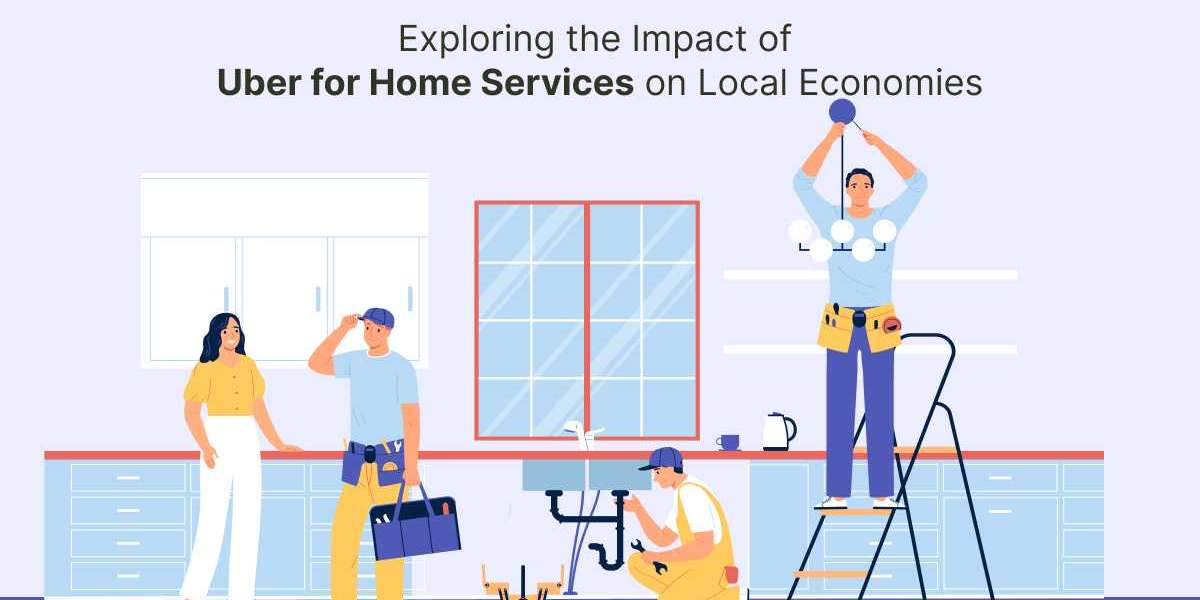The on-demand economy has reshaped the way people access services, and "Uber for Home Services" apps have been at the forefront of this transformation. These apps allow users to book a wide range of services, from cleaning and plumbing to electrical repairs and gardening, all with the convenience of a few taps on their smartphones. But beyond the ease they bring to customers, these apps have had a significant impact on local economies.
In this blog, we’ll dive deep into how Uber for Home Services is driving economic growth, creating jobs, supporting small businesses, and changing the dynamics of local markets.
The Rise of Uber for Home Services
What Are Uber for Home Services Apps?
These apps are platforms that connect customers with service providers in their area. Similar to Uber connecting riders with drivers, home service apps enable users to book professionals for specific tasks.
Why They’re Gaining Popularity
- Convenience: Customers can book services on-demand without the hassle of finding and contacting providers manually.
- Transparency: Reviews, ratings, and pricing are displayed upfront, helping users make informed decisions.
- Flexibility: Service providers have the freedom to accept jobs based on their availability and preferences.
The convenience and flexibility offered by these apps have made them indispensable in urban and suburban areas.
Creating Job Opportunities
Employment for Skilled and Semi-Skilled Workers
Uber for Home Services apps has created a wide range of job opportunities for individuals with various skill sets. From electricians and carpenters to cleaners and tutors, these platforms provide a steady stream of work.
For individuals who may not have formal employment, these apps offer a chance to earn a stable income while working flexible hours. This is particularly beneficial for those who want to balance work with personal responsibilities.
Empowering Gig Workers
The gig economy has gained momentum thanks to these platforms. Professionals can choose their working hours, accept jobs that match their skills, and earn based on their efforts. For many, this has become a viable alternative to traditional employment.
Boosting Small and Local Businesses
Exposure to a Broader Customer Base
Small businesses and independent service providers often struggle with marketing and customer acquisition. By registering on an Uber for Home Services app, they gain access to a large user base actively seeking their services.
This exposure allows local businesses to scale their operations without investing heavily in advertising or customer outreach.
Simplified Business Operations
These platforms handle the logistical aspects, such as payment processing, customer communication, and appointment scheduling. This enables service providers to focus solely on their work, improving their efficiency and quality of service.
Encouraging Skill Development
Upskilling Opportunities
To stay competitive, many service providers are motivated to improve their skills and certifications. Uber for Home Services apps often offer training programs or partnerships with skill development organizations.
For instance, electricians may take additional courses to handle advanced equipment, or cleaners might learn eco-friendly cleaning techniques. This not only benefits the workers but also ensures better service quality for customers.
Building Professionalism
Service providers working through these platforms are often held to high standards due to customer reviews and ratings. This encourages them to maintain professionalism, punctuality, and high-quality service delivery.
Driving Economic Growth
Increased Spending in Local Markets
As service providers earn more through these platforms, their spending power increases, benefiting local businesses. From groceries to entertainment, the earnings from these apps often circulate within the local economy, creating a ripple effect.
Tax Revenue Generation
With the formalization of on-demand services, governments can collect taxes from these transactions. This additional revenue can be reinvested into infrastructure, education, and other public services, further supporting economic growth.
Promoting Technology Adoption
Digitizing Local Economies
Uber for Home Services apps encourages the adoption of technology among service providers who may not have been tech-savvy. By using these platforms, they learn to navigate digital tools like apps, online payments, and customer management systems.
This exposure to technology often extends beyond their work, enabling them to explore other digital opportunities and improve their overall quality of life.
Improving Financial Inclusion
Many of these apps facilitate cashless payments, which can help unbanked or underbanked individuals integrate into the formal financial system. With steady earnings and digital payment histories, service providers can even access loans or other financial services more easily.
Changing Customer Behavior
Increased Trust in Local Services
One of the biggest challenges in hiring local service providers is the lack of trust. Uber for Home Services apps address this by providing verified professionals, transparent pricing, and customer reviews.
This has encouraged more people to hire locally, fostering a sense of community support while also boosting the demand for these services.
Demand for High Standards
As customers become accustomed to the professionalism and efficiency offered by these platforms, their expectations for quality services have increased. This has set a new benchmark for local service providers, encouraging continuous improvement.
Challenges and Considerations
While the impact of Uber for Home Services apps on local economies is largely positive, some challenges need to be addressed.
Ensuring Fair Compensation
These platforms need to ensure that service providers are fairly compensated for their work. Transparent payment structures and minimal commission rates can help strike a balance between platform profitability and worker earnings.
Worker Protections
As gig workers, service providers may lack access to benefits like health insurance or retirement plans. Platforms can explore partnerships or programs to offer these benefits, ensuring long-term worker satisfaction and security.
Digital Divide
Not all service providers may have access to smartphones or the internet. To ensure inclusivity, platforms can offer low-tech solutions or provide the necessary resources to onboard more workers.
Conclusion
Uber for Home Services apps has brought a revolution to local economies, creating jobs, supporting small businesses, and promoting the adoption of technology. By connecting customers with skilled service providers, these platforms have not only made daily tasks more convenient but also contributed to economic growth and community development.
For businesses and entrepreneurs, taking inspiration from an app like Gojek can be a powerful strategy to build a comprehensive platform that serves multiple needs. By addressing challenges and continuing to innovate, these apps can unlock even greater potential for local economies in the future.







